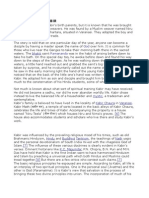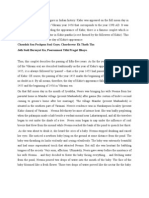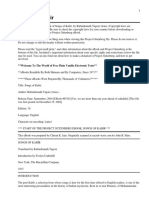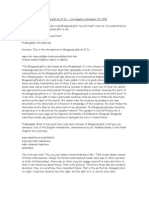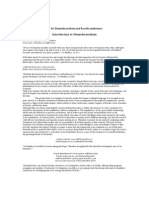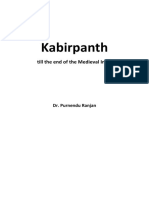0 ratings0% found this document useful (0 votes)
145 viewsIndian Poetry After Islam
Indian Poetry After Islam
Uploaded by
Khawar ShahzadKabir was a 15th century Indian poet and saint who was born to a Muslim family but influenced by Hinduism. He was equally critical of both religions. Kabir emphasized devotion to the divine truth over religious labels or practices. Mirabai was a 16th century Hindu princess and mystic poet who defied expectations to devote herself to Krishna. Tukaram was a 17th century Marathi poet from a merchant family who began writing religious poetry after visions. He faced opposition from Brahmins but is admired in Vaishnavism.
Copyright:
© All Rights Reserved
Available Formats
Download as PPTX, PDF, TXT or read online from Scribd
Indian Poetry After Islam
Indian Poetry After Islam
Uploaded by
Khawar Shahzad0 ratings0% found this document useful (0 votes)
145 views11 pagesKabir was a 15th century Indian poet and saint who was born to a Muslim family but influenced by Hinduism. He was equally critical of both religions. Kabir emphasized devotion to the divine truth over religious labels or practices. Mirabai was a 16th century Hindu princess and mystic poet who defied expectations to devote herself to Krishna. Tukaram was a 17th century Marathi poet from a merchant family who began writing religious poetry after visions. He faced opposition from Brahmins but is admired in Vaishnavism.
Original Title
Indian poetry after Islam (1)
Copyright
© © All Rights Reserved
Available Formats
PPTX, PDF, TXT or read online from Scribd
Share this document
Did you find this document useful?
Is this content inappropriate?
Kabir was a 15th century Indian poet and saint who was born to a Muslim family but influenced by Hinduism. He was equally critical of both religions. Kabir emphasized devotion to the divine truth over religious labels or practices. Mirabai was a 16th century Hindu princess and mystic poet who defied expectations to devote herself to Krishna. Tukaram was a 17th century Marathi poet from a merchant family who began writing religious poetry after visions. He faced opposition from Brahmins but is admired in Vaishnavism.
Copyright:
© All Rights Reserved
Available Formats
Download as PPTX, PDF, TXT or read online from Scribd
Download as pptx, pdf, or txt
0 ratings0% found this document useful (0 votes)
145 views11 pagesIndian Poetry After Islam
Indian Poetry After Islam
Uploaded by
Khawar ShahzadKabir was a 15th century Indian poet and saint who was born to a Muslim family but influenced by Hinduism. He was equally critical of both religions. Kabir emphasized devotion to the divine truth over religious labels or practices. Mirabai was a 16th century Hindu princess and mystic poet who defied expectations to devote herself to Krishna. Tukaram was a 17th century Marathi poet from a merchant family who began writing religious poetry after visions. He faced opposition from Brahmins but is admired in Vaishnavism.
Copyright:
© All Rights Reserved
Available Formats
Download as PPTX, PDF, TXT or read online from Scribd
Download as pptx, pdf, or txt
You are on page 1of 11
World Literature
Indian Poetry After Islam
Indian Poetry After Islam
Kabir, (Arabic: “Great”) (born 1440, Varanasi, Jaunpur, India—died
1518, Maghar), revolutionary Indian poet-saint respected by Hindus,
Muslims, and Sikhs.
The birth of Kabir remains hidden in mystery and legend. Authorities
disagree on both when he was born and who his parents were. According
to one legend, his mother was a Brahman who became pregnant after a
visit to a Hindu shrine. Because she was unwed, she abandoned Kabir,
who was found and adopted by a Muslim weaver. That his early life
began as a Muslim there is little doubt, but he was later strongly
influenced by a Hindu ascetic, Ramananda.
Although Kabir is often depicted in modern times as a harmonizer of
Hindu and Muslim belief and practice, it would be more accurate to say
that he was equally critical of both, often conceiving them as parallel to
one another in their misguided ways.
Kabir
What really counted, for Kabir, was utter faithfulness to
the one deathless truth of life, which he associated
equally with the designations Allah and Ram—the latter
understood as a general Hindu name for the divine, not
the hero of the Ramayana. Kabir’s principal media of
communication were songs, rhymed couplets called
(dohas) sometimes called “words” (shabdas) or
“witnesses” (sakhis). A number of those couplets, and
others attributed to Kabir since his death, have come to
be commonly used by speakers of north Indian
languages.
Kabir
Kabir’s poetic personality has been variously
defined by the religious traditions that respect
him, and the same can be said for his
hagiography. For Sikhs he is a ancestor and
speaker of Nanak, the founding Sikh Guru
(spiritual guide). Muslims place him in Sufi
(mystical) lineages, and for Hindus he
becomes a Vaishnavite (devotee of the god
Vishnu) with universalist leanings.
Kabir
Butwhen one goes back to the poetry that can
most reliably be attributed to Kabir, only two
aspects of his life emerge as truly certain: he
lived most of his life in Banaras (now
Varanasi), and he was a weaver, one of a low-
ranked caste that had become largely Muslim
in Kabir’s time.
Kabir
The Kabir Panth regards Kabir as its principal
guru or even as a divinity—truth incarnate.
The broad range of traditions on which Kabir
has had an impact is testimony to his massive
authority, even for those whose beliefs and
practices he criticized so unsparingly. From
early on, his presence in collected works of
North Indian bhakti (devotional) poetry is
remarkable
Meera (Mirabai)
Mirabai was a great Bhakti saint, Hindu mystic poet and
a devotee of the Lord Krishna. Born in the late fifteenth
century into a royal family of Rajasthan, Mira, from her
childhood was a great devotee of Lord Krishna and
wrote many beautiful poems in praise of her Lord. The
‘bhajans’ she wrote so many centuries ago are still sung
by Krishna devotees all over the world. However, her
life is equally inspiring from another point of view. One
may draw parallel between her life and the struggle
many modern women have to undergo in order to lead a
life of their choice.
Mirabai
Married off to Prince Bhoj Raj of Chittor at a tender age
she was expected to lead the life of a princess and was
pressured into devoting her time to her domestic duties.
Yet, young as she was, she stood firm and devoted her
life in the service of her Lord. Neither riches nor danger
to her life could discourage her from her path. When it
became impossible to live within the royal household,
she chose to leave home and went to Vrin-dha-vun,
where Lord Krishna had spent his boyhood days. There
she led the life of a saint, devoting her time in the service
of Lord Krishna.
Sant Tukaram
Tukaram also Shri Tukaram, and colloquially
referred to as "Tuka" , was a seventeenth century
Marathi poet Sant of India, related to the Bhakti
movement of Maharashtra. Tukaram was a
devotee of Vitthal (a form of Lord Krishna), the
supreme God in Vaishnavism. He is especially
admired by the Varkari community. Tukaram's
poetry is widely recognized as the climactic point
of the Bhagawat .
Tukaram
Born in a family of traders, Tukaram was
innocent of worldly ways, and was often cheated
and humiliated in dealings with the public. His
dramatic misadventures as an unworldly man are
a favorite topic for story tellers. After being
visited in a dream by Namdev, and Lord Vitthal
himself, Tukaram began to write (religious
poetry). His religious activities provoked the
Brahmin, who victimized him.
Tukaram
Inthe forty-eighth year of his life, in 1649, Tukaram
disappeared. There is disagreement about Tukaram's
final day. Some say that he informed his wife early
in the day that he was going to Vaikuntha (the
Divine Abode), and his wife laughed at him. He
went up the hill and waited for Vithoba. By that
time, news had spread around Dehu and people had
gathered around the hill, waiting for the Divine
event. From eyewitness accounts, a large vehicle
appeared from the skies and Vithoba emerged.
You might also like
- SB-2.9.33 To 36 - Catus Sloki BhagavatamDocument35 pagesSB-2.9.33 To 36 - Catus Sloki BhagavatamAnantaNo ratings yet
- Eka Sarana Dharma of Srimanta SankardevaDocument39 pagesEka Sarana Dharma of Srimanta SankardevaParan Goswami33% (3)
- V M Basheer The Card Sharper's DaughterDocument7 pagesV M Basheer The Card Sharper's DaughterBobNathanael67% (3)
- Awaken Children 2 English Ebook PDFDocument303 pagesAwaken Children 2 English Ebook PDFMeritxell Jiménez BonetNo ratings yet
- Mathura Meets Vrindavana Gour GovindaDocument169 pagesMathura Meets Vrindavana Gour GovindaKaivalya Das100% (3)
- Gita Summary in AcronymsDocument47 pagesGita Summary in Acronymsastrokpm100% (3)
- Kabir: God Bhakti RamanandaDocument15 pagesKabir: God Bhakti RamanandaJitendra Kumar DixitNo ratings yet
- Sant Kabir Das Seminar ProjectDocument16 pagesSant Kabir Das Seminar ProjectKrishna25% (4)
- Kabir (1398-1518) (1) 14-15 Was A 1Document2 pagesKabir (1398-1518) (1) 14-15 Was A 1kushkuril24No ratings yet
- Satguru Kabir: Al-Kabir ("The Great") Is Also One of The in Islam. For A Complete Disambiguation Page, SeeDocument5 pagesSatguru Kabir: Al-Kabir ("The Great") Is Also One of The in Islam. For A Complete Disambiguation Page, SeeKhawerEijazNo ratings yet
- Eastern Pali ScholarsDocument12 pagesEastern Pali ScholarsBhupinder SambriaNo ratings yet
- TukaramDocument4 pagesTukaramAsif ShaikhNo ratings yet
- Presentation Bhakti SufiDocument3 pagesPresentation Bhakti Sufiayonroy334No ratings yet
- Kabir & KalidasaDocument20 pagesKabir & KalidasaGaurav Kumar75% (4)
- Sikh Religion Volume 06 by Max Arthur Maucliffe PDFDocument460 pagesSikh Religion Volume 06 by Max Arthur Maucliffe PDFDr. Kamalroop SinghNo ratings yet
- SankardevDocument14 pagesSankardevChinmoy TalukdarNo ratings yet
- Kabir Das HistoryDocument3 pagesKabir Das HistorySriram SusarlaNo ratings yet
- World Literature Report On "Indian Poetry After Islam"Document10 pagesWorld Literature Report On "Indian Poetry After Islam"Muhammad Uraib razaNo ratings yet
- Ancient India and Its LiteratureDocument4 pagesAncient India and Its LiteratureCute TzyNo ratings yet
- Mirabai Poems CollectionDocument59 pagesMirabai Poems CollectionElliot Randolph Savage100% (3)
- Paper 8Document29 pagesPaper 8Aarti AhujaNo ratings yet
- Lal DedDocument15 pagesLal DedJudat AhangerNo ratings yet
- Chaitanya's Life And Teachings: From his contemporary Begali biography the Chaitanya-charit-amritaFrom EverandChaitanya's Life And Teachings: From his contemporary Begali biography the Chaitanya-charit-amritaNo ratings yet
- Section V Bhakti MovementsDocument7 pagesSection V Bhakti MovementsMammen JosephNo ratings yet
- Bhakti As ProtestDocument8 pagesBhakti As ProtestTheOneWhoGetsNo ratings yet
- Pandey MrbContributionsBhakti 1965Document21 pagesPandey MrbContributionsBhakti 1965chandrikamittal228No ratings yet
- The Story of The MahabharataDocument4 pagesThe Story of The MahabharataMaureen Domingo-BondocNo ratings yet
- History of VaisnavismDocument19 pagesHistory of VaisnavismRabi Narayan MohantyNo ratings yet
- History ProjectDocument14 pagesHistory ProjectmayankwwkfNo ratings yet
- I Sing For Him JoyfullyDocument3 pagesI Sing For Him JoyfullysasoikumarNo ratings yet
- Bhakti MovementDocument6 pagesBhakti MovementJames RajanNo ratings yet
- Great Personalities of IndiaDocument20 pagesGreat Personalities of IndiaBejavada SureshNo ratings yet
- Songs of Kabir PDFDocument29 pagesSongs of Kabir PDFEhsanul KabirNo ratings yet
- Songs of KabirDocument29 pagesSongs of KabirBibhas MondalNo ratings yet
- Intended Learning Outcomes: India-Land of PrayerDocument24 pagesIntended Learning Outcomes: India-Land of PrayerJewo CanterasNo ratings yet
- ChaiDocument9 pagesChaichandanuppinNo ratings yet
- Songs of KabirDocument34 pagesSongs of KabirNemraj RamsohoyNo ratings yet
- BanabhattaDocument101 pagesBanabhattaAnonymous 9hu7flNo ratings yet
- Indian Literature With A Management Perspective Unit I PDFDocument34 pagesIndian Literature With A Management Perspective Unit I PDFRobert youny nhambeNo ratings yet
- One Hundred Poems of KabirDocument178 pagesOne Hundred Poems of Kabirpawandalmia14100% (1)
- Sant TukArAm English BiographyDocument16 pagesSant TukArAm English BiographyGanesh RahaneNo ratings yet
- Lctr10.2 NBhatt MiraBai PDFDocument16 pagesLctr10.2 NBhatt MiraBai PDFamnotaname4522No ratings yet
- The Rama Story of Brij Narain Chakbast: Neil Krishan AggarwalDocument16 pagesThe Rama Story of Brij Narain Chakbast: Neil Krishan Aggarwaliona_hegdeNo ratings yet
- Indian LiteratureDocument2 pagesIndian Literaturerufinoarlyn120No ratings yet
- Afro Asian Lit Study GuideDocument13 pagesAfro Asian Lit Study GuidePrecious Rachel TuanoNo ratings yet
- Songs of KabirDocument342 pagesSongs of KabirSant MatNo ratings yet
- Srimanta SankardevaDocument6 pagesSrimanta SankardevaBibek Baruti100% (2)
- Semifinal Lit. 2Document16 pagesSemifinal Lit. 2Xia JimNo ratings yet
- Adi ShankaracharyaAdi ShankaracharyaDocument7 pagesAdi ShankaracharyaAdi ShankaracharyaYakshitha ReddyNo ratings yet
- El114 Afro Asian Prelim To Modterm Topics 084250Document12 pagesEl114 Afro Asian Prelim To Modterm Topics 084250Angela BañezNo ratings yet
- 0095 CH 3 App 130Document36 pages0095 CH 3 App 130Bawa100% (1)
- Painting from the Palette of Love: The Mystical Poetry of KabirFrom EverandPainting from the Palette of Love: The Mystical Poetry of KabirNo ratings yet
- Songs of Kabir by TagoreDocument70 pagesSongs of Kabir by TagoreShiva PatilNo ratings yet
- Songs of KabirDocument54 pagesSongs of KabirAnil V. WalkeNo ratings yet
- India Literary PiecesDocument15 pagesIndia Literary PiecesJames Geronimo LopezNo ratings yet
- The Life of Baba Bulle ShahDocument40 pagesThe Life of Baba Bulle Shahrohitt124No ratings yet
- Sant Dnyaneshwar - Beyond Brahmanical Tyrannye Warkari Movement I Sant DnyaneshwarDocument4 pagesSant Dnyaneshwar - Beyond Brahmanical Tyrannye Warkari Movement I Sant DnyaneshwarRupa AbdiNo ratings yet
- Ambedkar and The Bhagwat GitaDocument10 pagesAmbedkar and The Bhagwat GitaVeeramani Mani100% (1)
- Literary Movements in ModernismDocument2 pagesLiterary Movements in ModernismKhawar ShahzadNo ratings yet
- Virginia WoolfDocument3 pagesVirginia WoolfKhawar ShahzadNo ratings yet
- Arundhati Roy.Document2 pagesArundhati Roy.Khawar ShahzadNo ratings yet
- Khaled HosseiniDocument6 pagesKhaled HosseiniKhawar ShahzadNo ratings yet
- Saadat Hasan MantoDocument2 pagesSaadat Hasan MantoKhawar ShahzadNo ratings yet
- Postwar and Post Colonial LiteratureDocument2 pagesPostwar and Post Colonial LiteratureKhawar ShahzadNo ratings yet
- Bhagavad Gita: A Pathway To Peace & Harmony: Dr. Sunil Kumar MishraDocument6 pagesBhagavad Gita: A Pathway To Peace & Harmony: Dr. Sunil Kumar MishraKrishna RathoreNo ratings yet
- Illustrated Encyclopedia of Hinduism VolDocument429 pagesIllustrated Encyclopedia of Hinduism VolCassidy EnglishNo ratings yet
- Sujit Mukherji Memorial Lecture Central University HyderabadDocument30 pagesSujit Mukherji Memorial Lecture Central University HyderabadMd Intaj AliNo ratings yet
- Nārada Pañcarātra, English, Chapter 1Document29 pagesNārada Pañcarātra, English, Chapter 1Damodara Dasa100% (1)
- Nectar of Devotion Course OutlineDocument24 pagesNectar of Devotion Course OutlineIsvarikripa100% (5)
- 2019 III JulyDocument128 pages2019 III JulyJason PearsonNo ratings yet
- YogDarshan - The History of YogaDocument2 pagesYogDarshan - The History of YogaKanniks KannikeswaranNo ratings yet
- Nectar of Instruction 7 8 WorksheetDocument4 pagesNectar of Instruction 7 8 WorksheetKrishna Chaitanya DasNo ratings yet
- Bhakti Among Women in Medieval IndiaDocument4 pagesBhakti Among Women in Medieval IndiaArshita KanodiaNo ratings yet
- Word-By-Word Meanings: Ramesh PanchagnulaDocument6 pagesWord-By-Word Meanings: Ramesh PanchagnulaRaghavendra UdayakumarNo ratings yet
- Nikshepa Raksha - Eng PDFDocument41 pagesNikshepa Raksha - Eng PDFenota15No ratings yet
- Damodarastakam Dig Darshini TikaDocument15 pagesDamodarastakam Dig Darshini TikaRobin BuckleyNo ratings yet
- Bhagavad-Gita - Doctrines and Contexts PDFDocument309 pagesBhagavad-Gita - Doctrines and Contexts PDFNirajDhotre100% (1)
- Service Life Layout02:Service LifeDocument86 pagesService Life Layout02:Service LifeDevashis Das100% (1)
- Bhagavat Gita As It Is DetailedDocument131 pagesBhagavat Gita As It Is DetailedsureshsudhagarNo ratings yet
- NCERT Solutions For Class 6 History Chapter 9 Traders Kings and PilgrimsDocument3 pagesNCERT Solutions For Class 6 History Chapter 9 Traders Kings and PilgrimsSakshi SargarNo ratings yet
- Prayer Hymns - Graha StotrasDocument0 pagesPrayer Hymns - Graha StotrassadanandameNo ratings yet
- Sri Bhakti-Sandarbha 2Document37 pagesSri Bhakti-Sandarbha 2radhapeiyeNo ratings yet
- Sanatana Goswami Sri Sri Damodarastakam and Kartika MahatmyaDocument24 pagesSanatana Goswami Sri Sri Damodarastakam and Kartika MahatmyaamolscribNo ratings yet
- Yoga NotesDocument11 pagesYoga NotesInsight Mndy100% (5)
- SikhismDocument14 pagesSikhismShaurya GidhwaniNo ratings yet
- Meditation 014-060 PrintDocument22 pagesMeditation 014-060 PrintGS TNo ratings yet
- Purnendu Ranjan - Kabirpanth Tiil The End of The Medieval EraDocument99 pagesPurnendu Ranjan - Kabirpanth Tiil The End of The Medieval EraDhira_No ratings yet
- Noi 4Document5 pagesNoi 4Amit ChauhanNo ratings yet
- BhaktiVriksha GlossaryDocument2 pagesBhaktiVriksha GlossaryAbhayNo ratings yet
- Gail Omvedt Caste and HinduismDocument2 pagesGail Omvedt Caste and HinduismPriyanshi KhandelwalNo ratings yet






